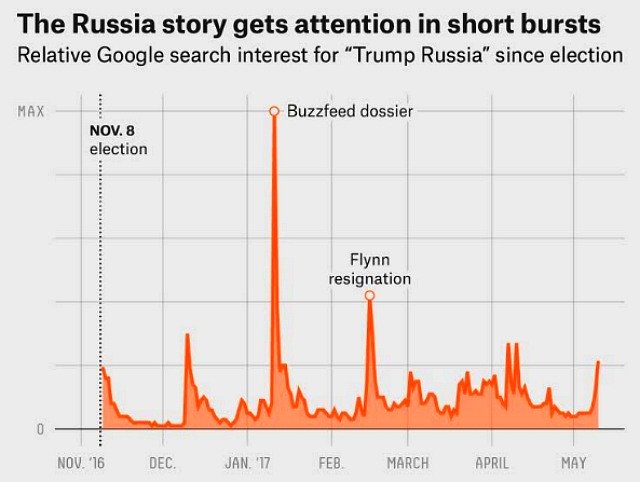I’ve been waiting and waiting for the Russia-Trump election interference story to become the New Watergate. I was elated by the Comey firing because it seemed as if this, finally, would launch this story into orbit. It was Nixon firing Cox all over again…great! But I was also brought down yesterday by a Nate Silver/538 story about how the Russia thing has failed to ignite so far.

Silver: “It’s also possible that Comey’s firing is just the latest in a series of short, exciting bursts of activity that don’t ultimately produce any lasting momentum or do all that much to undermine Trump. This has mostly been the pattern of these Trump-Russia stories so far.” Three spikes — the British pee-pee tape dossier last January, the MNichael Flynn reisgnation in February and now the Comey firing.
Silver’s bottom line: “These [news] spikes have been relatively short-lived, and there has been no long-term increase in public attention to the story.”
Here’s a rousing Washington Post story about (a) how Trump ordered Attorney General Jeff Sessions and Deputy Attorney General Rod J. Rosenstein to tap out rationales for Comey’s dismissal, and (b) how Rosenstein “threatened to resign” over the subsequent narrative that Rosenstein “was the prime mover of the decision to fire Comey and that the president acted only on his recommendation.”
The story, posted at 11:14 om last night, was written by Philip Rucker, Ashley Parker, Sari Horwitz and Robert Costa.
Excerpt: “[Last] Monday morning in Washington, Trump told Vice President Pence and several senior aides — Reince Priebus, Stephen K. Bannon and Donald McGahn, among others — that he was ready to move on Comey.
“First, though, he wanted to talk with Attorney General Jeff Sessions, his trusted confidant, and Deputy Attorney General Rod J. Rosenstein, to whom Comey reported directly.
“Trump summoned the two of them to the White House for a meeting, according to a person close to the White House. The president already had decided to fire Comey, according to this person. But in the meeting, several White House officials said Trump gave Sessions and Rosenstein a directive: to explain in writing the case against Comey.
“The pair quickly fulfilled the boss’s orders, and the next day Trump fired Comey — a breathtaking move that thrust a White House already accustomed to chaos into a new level of tumult, one that has legal as well as political consequences.
“Rosenstein threatened to resign after the narrative emerging from the White House on Tuesday evening cast him as a prime mover of the decision to fire Comey and that the president acted only on his recommendation, said the person close to the White House, who spoke on the condition of anonymity because of the sensitivity of the matter.”
